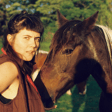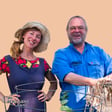
Voluntary Extinction with Annie Raser-Rowland
Would you pick up a schoolkid’s half eaten apple and eat it?
Annie Raser-Rowland would, while shining a lopsided smile to passersby.
Annie is the radical wordsmith behind the bestselling The Art Of Frugal Hedonism and The Weed Forager’s Handbook, co-authored with the equally-and-proudly-as-stingy Adam Grubb.
This is one helluva conversation that covers:
🌟Why to be even weirder
🌟Rubbing frugality pheromones on your significant other
🌟Starting work at 3am
🌟Engaging teenage goth mode to deal with chronic health challenges
🌟Embracing voluntary extinction
🌟Leaving room for the more-than-human
🌟The plight of a brushtail possum in our wall.
Lap it up!
🧙♀️LINKY POOS
The Art of Frugal Hedonism (revised edition!)
Permaculture Principles ~ who sell ethically published books and have a wealth of free educational materials.
*** Support the show on Patreon***
(I’m loving this 🌟emoji which makes me feel like I’m doing a great job. You’re doing a great job too 🌟🌟🌟)



















